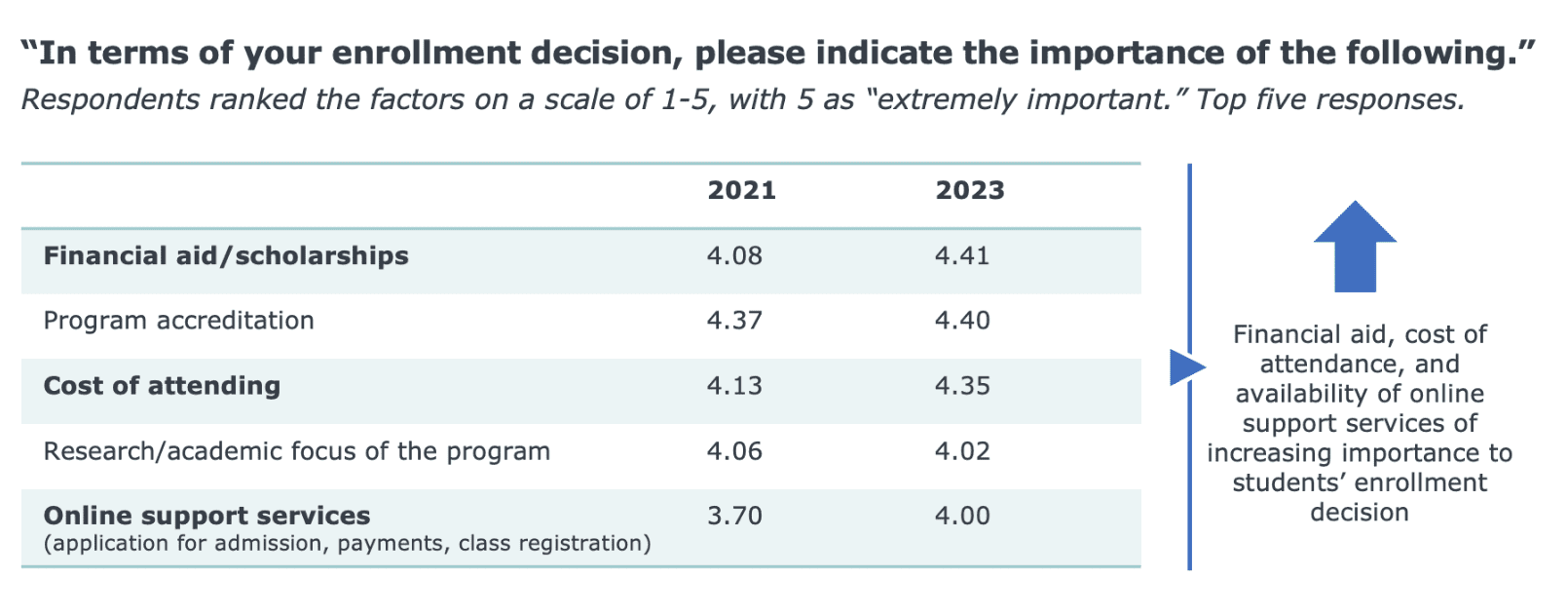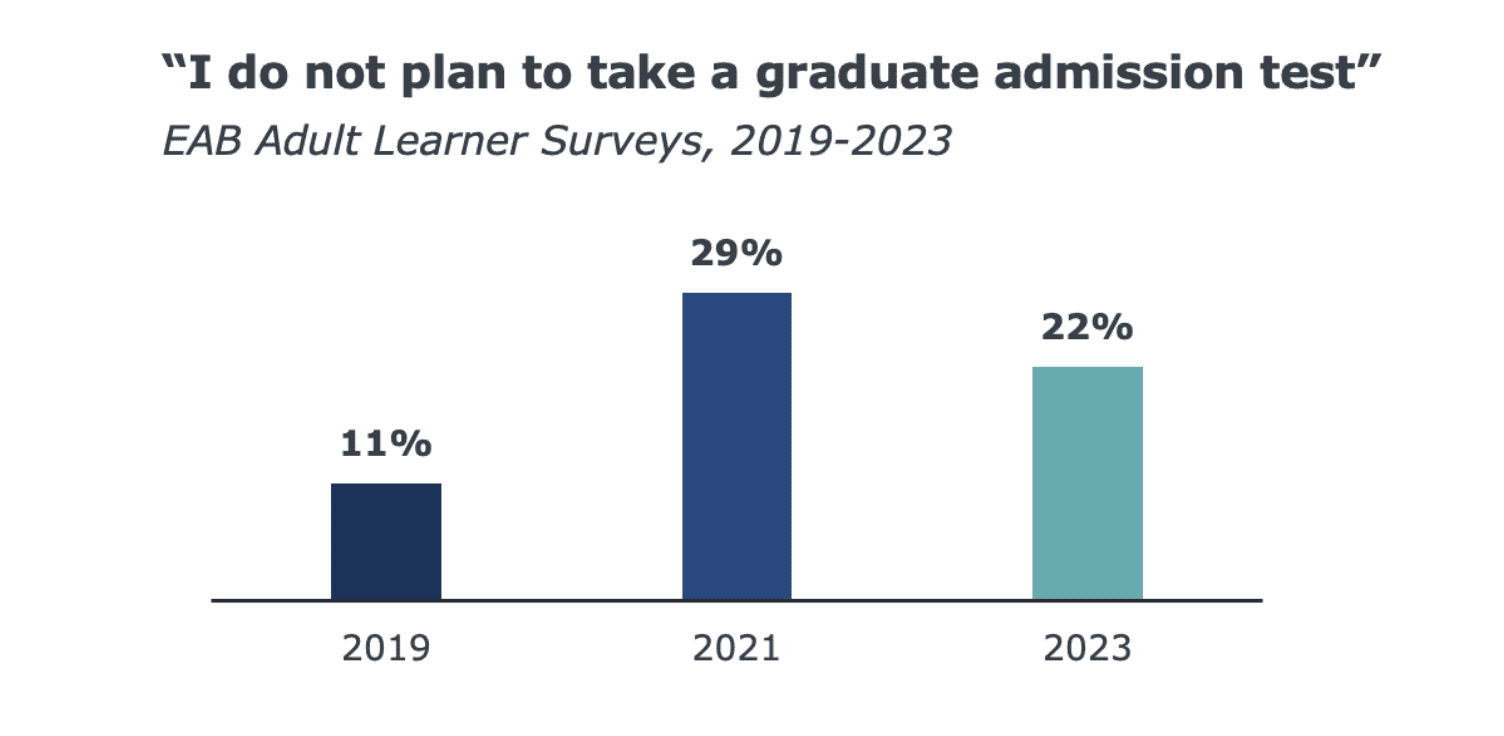Adult learners’ application behavior is changing—here’s how
As the demographics of prospective graduate students and adult learners change, so do students’ application preferences and behaviors. To better understand how students are choosing which programs to apply to—and ensure our partners are equipped to meet their needs—our Adult Learner Recruitment team recently surveyed more than 3,800 prospective graduate, online, and adult students. Here’s what we learned.
MEET YOUR NEW GRADUATE AND ADULT LEARNER
Adult learners are increasingly making enrollment decisions based on affordability
Gen Z is especially cost-conscious and prioritizes financial stability, perhaps because many students saw their parents live through the Great Recession and witnessed Millennials struggle with debt. This cost-consciousness impacts the way this new generation of prospective graduate and adult learners approaches higher ed. In this year’s survey, students identified financial aid and scholarships as the most important factors in their enrollment decision. This marks the first time respondents have listed financial aid and scholarships as their top criteria since we began surveying adult learners in 2019. And about half (49.5%) of surveyed students indicated they are willing to spend no more than $15,000 annually on their education.
HOW TO COMMUNICATE FINANCIAL INFORMATION TO GEN Z STUDENTS
Concerns about affordability raise questions about DEI. Historically underrepresented students, including Black, Asian, and Hispanic students, disproportionately identified scholarships and cost of attendance as top factors in their enrollment decisions, as did female students and students who identify as caregivers.

Respondents are also increasingly relying on scholarships and financial aid to help fund their education. Fifty-five percent of students said they will have scholarships, compared to 42% in our 2021 survey. Make information about program costs, scholarship opportunities, and financial aid readily accessible on program pages to address students’ concerns about affordability.
Adult learners are applying to just a couple of programs
This year’s survey reinforced the idea that graduate and adult learners spend significant time researching programs, but ultimately apply to very few. On average, surveyed students applied to 2.24 programs. However, there are notable differences across key student segments. Prospective degree completers, for example, typically applied to slightly fewer programs than prospective graduate students. Students interested in online programs also applied to fewer programs than those who seek an in-person program.
-
2.24
The number of programs surveyed students applied to, on average.
HEAR MORE SURVEY INSIGHTS AND ANALYSIS BY OUR EXPERTS
Students continue to opt out of admissions tests
We continue to see students opt out of taking graduate admissions tests where possible. Twenty-two percent of students indicated they do not plan to take a graduate admission test. This number is lower than the percentage of students who indicated they did not plan to take a test in 2021 (29%). However, the number of students who did not take an admissions test in 2021 was likely inflated, as many institutions waived test requirements due to the pandemic. The number of students who do not plan to take an admission test this year remains much higher than pre-pandemic levels (22% compared to 11% in 2019).

Students seek career advancement—but also the opportunity to pursue their passions
Not surprisingly, survey respondents most often identified “career advancement” as the primary reason they seek further education. But no two adult learners are the same. And in this year’s survey, about 30% of students said they want to further their education to “pursue their passions” and “make a difference in the world.” This could be due, in part, to Gen Z’s entrance into the grad and adult learner market. Forty-one percent of surveyed students under age 26 said they seek to pursue their passions, compared to about 25% of students 26-35 and 27% of students over 35. Gen Z may also be less focused on career outcomes than older students because they are typically earlier in their careers.

Consider ways your team can ensure your marketing responds to each student’s motivations. Our Adult Learner Recruitment partners have had success identifying student motivations through micro-surveys—and then using those motivations to craft marketing messages that speak to that individual student’s intentions.
HOW GRADUATE AND ADULT-SERVING PROGRAMS ARE USING INTENT MARKETING
As Gen Z continues to comprise more of the graduate and adult learner market, we’ll be watching shifts in student preferences and behavior closely, and we look forward to sharing those insights with you.

More Blogs

The big bets that actually drive online enrollment growth

How to use state demand data to launch or revitalize programs
